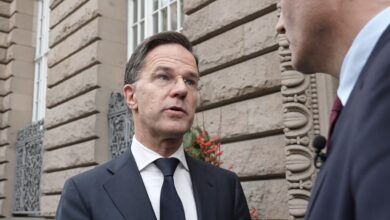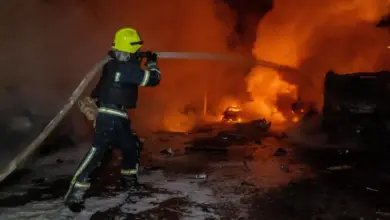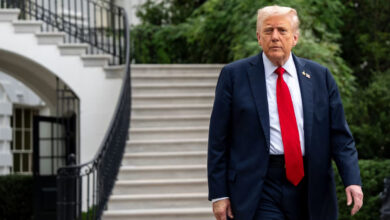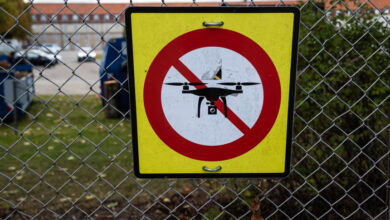Benghazi — Libyan rebels hit out at the NATO-led air mission, saying that it was failing in its UN mandate to protect civilians in the besieged third city of Misrata.
The accusation came Tuesday as the rebels sustained their first significant loss of territory to Muammer Qadhafi's forces in almost a week, after they were sent fleeing from the edge of the oil town of Brega in a major assault.
Rebel spirits however were boosted when a one-million-barrel supertanker docked in the port of Tobruk, ready to load their first oil export shipment, potentially worth more than USD100 million (70.5 million euros).
The Libyan government meanwhile named a replacement for its former foreign minister Mussa Kussa who defected to the West last week.
The top commander of rebel forces, Abdelfatah Yunis, accused NATO-led aircraft of doing nothing while loyalist forces kept up their 40-day long artillery bombardment of civilians in the city of Misrata.
NATO "is letting the people of Misrata die every day," Yunis told reporters in the rebel stronghold of Benghazi.
"If NATO waits one more week, there will be nothing left in Misrata," he added.
"If NATO wanted to break the blockade of the city, they would have done it several days ago…Every day, civilians — elderly people and children — are dying in Misrata. NATO has done nothing, they have just bombed here and there."
Doctors said last week that 200 people had been killed in Misrata since the uprising began on 17 February, a figure that is likely to have risen in recent days.
A Turkish aid ship brought out scores of wounded of the city over the weekend, who told harrowing tales of the bombardment of residential areas by loyalist artillery.
NATO's chief of allied operations, Brigadier General Mark van Uhm, said the alliance was doing all it could to protect civilians in the city.
"Misrata is a number one priority because of the situation on the ground over there," the NATO chief of allied operations said.
"We have confirmation that in Misrata tanks are being dispersed, being hidden, (and) humans being used as shields in order to prevent NATO sorties to identify targets," he said.
Van Uhm said that the international air operation, under NATO command since late last week, had had a major impact.
"We have taken out 30 percent of military capacity of pro-Qadhafi forces," said Brigadier General Mark van Uhm, citing an assessment by the Libya operation's commander, Lieutenant General Charles Bouchard.
Qadhafi's forces pushed back rebels from the oil refinery town of Brega on the central Mediterranean coast, despite a NATO air strike on loyalists who launched an intensive artillery barrage at their fleeing foes.
Heavy fighting erupted in the morning around Brega, with rebels using rocket launchers to counter the incoming artillery barrage of loyalists.
But by afternoon, the rebels were seen pulling back in hundreds of vehicles in the direction of Ajdabiya, a transport hub about 80km (50 miles) back towards their stronghold of Benghazi.
The rebels played down the loss of territory, saying it was unlikely to be the last reverse they suffered before Qadhafi's regime was overthrown.
"There is no revolution without setbacks," Mustafa Gheriani, a spokesman for the rebels' Transitional National Council told AFP.
"But the people will win. Kadhafi cannot rule Libya with his machine — his militias and his mercenaries…We are committed to fighting this tyrant, and either we will drive him out or he will rule a country with no people in it."
Earlier the Libyan government said it was ready to negotiate reforms but only provided Moamer Kadhafi was not forced out.
Government spokesman Mussa Ibrahim told journalists in Tripoli that everything except the departure of Qadhafi was negotiable, saying he was a unifying figure after ruling the nation for four decades.
"What kind of political system is implemented in the country? This is negotiable, we can talk about it," Ibrahim said. "We can have anything, elections, referendums."
But Qadhafi's future was sacrosanct, he stressed, only hours after the rebels flatly rejected a reported peace deal that could see the embattled leader's son take charge of the North African nation.
The "guide of the revolution," who has always rejected the title of head of state, was "the safety valve" for the unity of the country's tribes and people, Ibrahim said. "We think he is very important to lead any transition to a democratic and transparent model."
Deputy foreign minister Khaled Kaim later said the rebels must first lay down their arms for talks to begin.
The government named deputy minister for European affairs Abdelati Obeidi as its new top diplomat to replace Kussa, the longtime head of Libyan intelligence who was regarded as a key confidant of Muammer Qadhafi before he took refuge in Britain last week, a senior foreign ministry official told AFP.
A former prime minister, Obeidi, has also served as foreign minister before.
Qadhafi's son Seif al-Islam dismissed Kussa as a "sick and old" man who succumbed to the psychological pressures of war.
The son, who had not been seen in public since coalition air strikes began on 19 March, said Kussa had been allowed to go abroad for medical treatment.
Asked in a BBC interview what information Kussa might provide the West, Seif al-Islam said: "He's sick, he's sick and old, of course, he would come out with funny stories."
But he dismissed the idea Kussa might have secrets to share, for instance on the extent of the involvement of the Libyan intelligence services, in which he was long a senior figure, in the December 1988 bombing of a US airliner over Lockerbie, Scotland, which killed 270 people.
"Like what? The British and Americans know about Lockerbie, there's no secrets any more," the son said.
A senior US diplomat arrived in Benghazi on Tuesday for talks with the rebels but the State Department said the move did not imply any recognition of their administration.
The envoy, Chris Stevens, will focus talks on humanitarian assistance as well as the rebel leadership's "democratic aspirations, commitment to universal human rights," said a State Department spokesman in Washington.
In The Hague, the prosecutor of the International Criminal Court said the killing of civilians in Libya followed a "pre-determined plan" that Qadhafi had prepared before the unrest.
"In January, after the revolts in Tunisia, they started to prepare to face problems in Libya, they organised themselves," Luis Moreno-Ocampo told AFP.
Moreno-Ocampo announced on 3 March that the ICC was investigating Qadhafi, three of his sons and other members of his regime for crimes against humanity.




